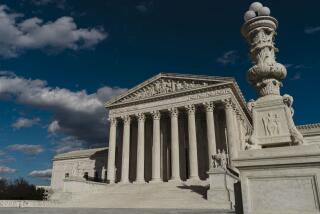Fight to vindicate general dies in the Senate
A determined family’s formal request to restore the rank and reputation of the late Air Force Gen. John D. Lavelle died in the Senate on Wednesday.
Lavelle, a four-star general who was demoted and stripped of his command in 1972 for bombing North Vietnam, died in 1979. He maintained that superiors authorized the bombings, and evidence unearthed by his family seems to support that version of events.
The White House backs Lavelle’s family, which hopes to clear his name before the general’s ailing widow dies. President Obama sent the Senate Armed Services Committee a nomination to restore Lavelle’s rank in August.
The decision rests with the committee because it approves presidential nominations and promotions for top military commanders. The panel declined to vote on the nomination Wednesday.
“We’re incredibly disappointed,” said Lavelle’s daughter, Jere Enloe. “We had all the proof we could possibly need.”
With the lame-duck Congress adjourned, the nomination is dead. If Lavelle’s rank and reputation are to be restored, the White House must resubmit the nomination in January.
For 38 years, Lavelle’s widow and seven children have fought to prove that the White House and the Pentagon secretly authorized him to bomb North Vietnam. Their quest took on new urgency when his widow, Mary Jo Lavelle, 92, was placed in critical care at a Virginia hospital last week. She was released Tuesday but remains in poor health.
Enloe said she did not tell her mother of the Senate’s inaction because of her fragile condition. Lavelle’s wife had nicknamed him “Smiling Jack” because he always had a smile for her.
Patrick A. Casey, a lawyer for the family, uncovered secret Pentagon documents that he says prove President Nixon and the Pentagon authorized the bombings but kept them secret.
Casey also located 1972 conversations from the Nixon White House tapes showing that Nixon authorized the bombings and worked with national security advisor Henry Kissinger to keep them secret. On the tapes, Nixon called Lavelle “an innocent man” and said he had been made “a goat,” or scapegoat.
Lavelle, who commanded air operations in Vietnam, was stripped of his command, demoted to a two-star general and forced to retire. The Air Force said he had violated the rules of engagement by ordering 24 airstrikes on enemy missile sites and antiaircraft batteries in North Vietnam.
Sens. Carl Levin (D-Mich.), the Armed Services Committee chairman, and John McCain (R-Ariz.), the ranking Republican, said Wednesday that the Pentagon should review “apparent inconsistencies” in recently released State Department records from the Vietnam era before the committee acts on Lavelle’s case.
Those documents were not seen by an Air Force review board that investigated the case, concluding last year that Lavelle was wrongly accused and should be restored in rank.
The Air Force Board of Correction of Military Records found that the White House and the Pentagon had withheld evidence that the bombings had been authorized by Nixon and the chain of command. It concluded that Lavelle was a victim of “error and injustice” because of “politically based decisions” that denied him due process.
Casey said Wednesday that the documents “fully vindicated” Lavelle’s position that “he was authorized and indeed ordered by the highest civilian and military leadership to conduct every airstrike he ordered.”
The Air Force board took on the Lavelle case in response to the new information Casey uncovered.
Several figures central to Lavelle’s demotion have come forward to say he was innocent.
R. James Woolsey, a former CIA chief who in 1972 was chief counsel to the Senate Armed Services Committee investigating the Lavelle affair, said the family’s evidence proved Lavelle was wrongly accused.
“Gen. Lavelle was indeed authorized to order all the missions in question,” Woolsey wrote the Senate committee. “The committee did not have the information in 1972 that could have led them to this conclusion.”
In 2007, former Defense Secretary Melvin R. Laird wrote Air Force Magazine that he had authorized Lavelle to apply rules of engagement “liberally” and to attack enemy antiaircraft sites.
But Kissinger, in an interview this week, said that Nixon never issued formal orders for the bombings and that Lavelle repeatedly violated existing orders.
The former national security advisor said that he had no opinion on the nomination to restore Lavelle’s rank. “I wish him well,” Kissinger said.
More to Read
Get the L.A. Times Politics newsletter
Deeply reported insights into legislation, politics and policy from Sacramento, Washington and beyond. In your inbox three times per week.
You may occasionally receive promotional content from the Los Angeles Times.







